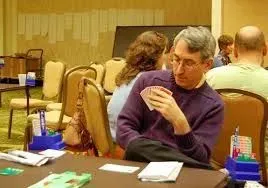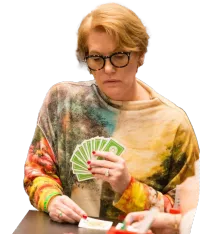
Lessons from the Top: My Interview with Bridge Champions Marty Fleisher and Chip Martel
As someone deeply passionate about the game of bridge, I’ve always been fascinated by the stories and strategies of the world’s best players. Recently, I had the privilege of sitting down with two legends of the game—Marty Fleisher and Chip Martel—for an in-depth conversation about their journeys, achievements, and the ever-evolving landscape of competitive bridge. Their insights not only shed light on what it takes to reach the top but also offer valuable lessons for anyone who loves the game.
Early Beginnings: Family Roots and First Deals
Both Marty and Chip’s love for bridge was sparked at a young age, thanks to the influence of family. Marty’s story begins at age eight, when his father, eager to find a shared hobby with his mother, enlisted Marty’s uncle—a talented club player—to teach them the game [00:38]. Marty was immediately hooked, and soon he and his uncle were regular partners at the table.
Chip’s introduction was similarly familial. Growing up in Urbana, Illinois, he learned bridge from his parents, playing casual games with his sister. It wasn’t until high school, after discovering Alfred Sheinwold’s “Five Weeks to Winning Bridge” on his parents’ bookshelf, that Chip’s interest turned serious . He quickly became a standout player, even teaching his friends and joining the competitive campus scene at the University of Illinois.

Career Milestones: Records, Championships, and Hall of Fame Honors
The early start paid off for both. Chip made history in 1982 as the youngest ever World Open Pairs champion, partnering with Lew Stans by for a remarkable 35-year run. Marty, meanwhile, set his own record as the youngest player to reach the finals of a national knockout—a record that still stands.
Both players’ achievements have been recognized at the highest level. Chip was inducted into the Bridge Hall of Fame in 2014, and Marty was recently honored with his own induction. For Marty, the honor was especially sweet, celebrated with friends and family in New York City after years of eligibility and a campaign led by Chip.
Partnership Dynamics: Building Trust and a Winning System
Despite being friends for over 45 years, Marty and Chip only began their formal partnership in 2014, after playing on the same team in 2013. Their partnership is built on mutual respect and a shared approach to the game. As Marty puts it, their styles are “pretty similar,” which made developing a system together a natural process.
They play a system known as the “Swedish club” with transfer responses—a structure Marty first used with Mike Camel. When it came time to partner with Chip, the decision was easy: “I want to play what you and Michael play,” Chip said. Their partnership notes now span about 90 pages, reflecting years of refinement and adaptation.
Tournament Experiences: Triumphs, Challenges, and the Thrill of Competition
Both Marty and Chip have competed—and won—at the highest levels, including the prestigious Bermuda Bowl. Marty’s 2017 Bermuda Bowl victory in Lyon, France, stands out as a career highlight . The win was especially dramatic: after trailing by 45 points late in the final, Marty returned from a walk to discover his team had surged ahead, clinching victory by just two imps.
Preparation for major tournaments like the Spingold is intense. Marty and Chip often avoid pair events together, preferring to focus their energy on team competitions. As Marty admits, he’s “not a morning person,” and the grueling schedule of some events can be exhausting. Instead, they prioritize practice sessions and reviewing their system notes to stay sharp.

Mentors and Influences: The Power of Community
Both players credit their development to early mentors and the vibrant bridge communities they grew up in. For Marty, Ron Gerard was the first expert to take an interest in his game, offering guidance and partnership. Chip benefited from a legacy of mentorship at the University of Illinois and later at MIT, where he played alongside some of the best young talents in the country.
This tradition of learning from others—and passing on knowledge—remains central to their philosophy. As they both emphasize, bridge is a game where continuous learning and adaptability are essential.
The Evolution and Fairness of Bridge
Bridge has changed significantly over the years. Both Marty and Chip note that the game has become more aggressive, with players bidding more frequently and creatively than in decades past. Advances in technology have also improved the fairness and security of major tournaments. The use of tablets at the United States Bridge Championships, for example, has minimized both active and incidental cheating, making the competition cleaner and more enjoyable for all.

Balancing Bridge with Professional Life
While bridge is a central passion, both Marty and Chip have maintained successful careers outside the game. Marty, in particular, has balanced his bridge ambitions with a career as a lawyer and financial manager.
This flexibility has allowed him to participate in major events and even hire teams, ensuring he can compete at the highest level while managing his professional responsibilities.
Reflections: Persistence, Camaraderie, and the Joy of the Game
One of the most striking themes from our conversation was the importance of persistence. Marty’s record for the longest gap—27 years—between coming second and finally winning a national championship is a testament to his resilience. Both players acknowledge that losing is a frequent part of bridge, even for the best. But it’s the camaraderie, the intellectual challenge, and the thrill of competition that keep them coming back.
Their favorite tournament? The United States Bridge Championships, praised for its fairness, organization, and the sense of community it fosters among players from around the world.

Conclusion: Lessons from the Champions
My conversation with Marty Fleisher and Chip Martel reinforced what I love most about bridge: it’s a game of endless learning, deep partnerships, and shared passion. Whether you’re a seasoned competitor or a newcomer, their stories remind us that success in bridge—like in life—comes from persistence, adaptability, and a willingness to learn from others.
If you’re inspired by their journey, I encourage you to dive deeper into the world of bridge, seek out mentors, and never stop striving for that next breakthrough at the table. The game is always evolving, and there’s always something new to discover.
Frequently Asked Questions (FAQ)
Q: How did Marty Fleisher and Chip Martel get started in bridge?
A: Both were introduced to the game by their families at a young age. Marty was taught by his uncle at age eight , while Chip learned from his parents and became serious about the game in high school after reading Alfred Sheinwold’s "Five Weeks to Winning Bridge".
Q: When did Marty and Chip become partners?
A: Although they have been friends for over 45 years, they officially began their partnership in 2014 [05:20].
Q: What system do Marty and Chip play?
A: They play a system known as the “Swedish club” with transfer responses, which Marty had previously used with another partner. Their partnership notes are about 90 pages long [08:20].
Q: What are some of their biggest career highlights?
A: Chip became the youngest-ever World Open Pairs champion in 1982 [01:40]. Marty’s most memorable win was the 2017 Bermuda Bowl in Lyon, France, which his team won by just two imps after a major comeback. Both have been inducted into the Bridge Hall of Fame.
Q: How has the game of bridge changed over the years?
A: According to Marty and Chip, the game has become more aggressive. They also noted that technology, such as the use of tablets in tournaments, has significantly improved the fairness and security of the game [13:54].
Visit Our Website: https://bridgeunleashed.com/
Bridge the gap between mastery and visibility.
With a seasoned approach to marketing, developed through decades of competitive Bridge play and marketing expertise,
I'm here to guide you to:

Expand Your Audience
Together, we’ll accelerate your audience growth using targeted marketing techniques that highlight what sets you apart. From navigating the digital landscape to leveraging the power of social media, you’ll receive personalized guidance to enhance your visibility and attract more students, clients, or members.

Craft Your Unique Brand
I’ll guide you through developing a marketing strategy that’s as unique as your approach to Bridge. We’ll work together to build a personal or organizational brand that captures the essence of your expertise and differentiates you.

Learn in a Community
Success in marketing is often about who you know as much as what you know. Expand your professional network, securing partnerships and collaborations that elevate your strategies while meeting and learning from your peers around the globe.

Master Engagement and Conversion
Learn the secrets to engaging your target audience and converting their interest into tangible outcomes. I’ll share with you the strategies behind effective communication, persuasive content creation, and delivering value that encourages your audience to take action.

About Me
BRIDGING COMPETITION AND MARKETING
Two decades of competitive Bridge experience melded with marketing expertise
Corporate career in sales and marketing working on global brands, Chanel and RayBan.
Innovative approach to marketing, tailored specifically to the needs of the Bridge community
Passionate about leveraging marketing to grow the game of Bridge at all levels
Let’s elevate your game, together.

